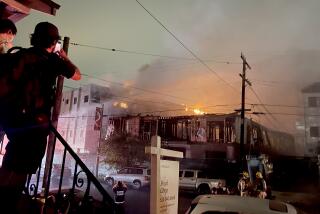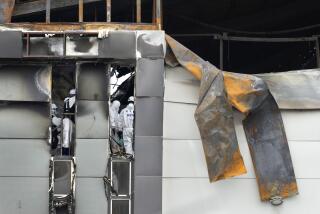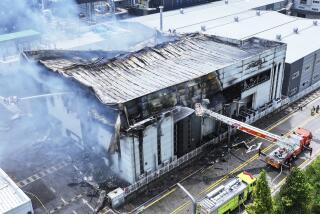Fire Kills 54, Injures 75 at Illegal Bar in S. Korea
INCHON, South Korea — At least 54 South Koreans, mainly high school students, were killed and 75 others were injured Saturday in a fire that trapped more than 100 people inside a cramped, illegal beer hall in the port city of Inchon, 30 miles west of Seoul.
Authorities said 97 of the 129 known victims were under the age of 18, the legal drinking age in Korea, and the youngest person killed in the blaze was just 13.
One girl who survived said that the bar door had been locked from the outside.
Many of the teenagers died from inhaling smoke and toxic fumes in a second-floor beer hall and a third-floor billiard room in a building that had windows that did not open, narrow corridors, only one small exit and no sprinklers, officials and witnesses said today. Police arrested four workers for alleged safety violations and reportedly were searching for the owner of the beer hall, which was a popular teen hangout known as a place where underage revelers could buy alcoholic drinks.
Eight days before the inferno, police had ordered the beer hall to be shut down for doing business without a license, and a spot check by local authorities Wednesday found that the establishment was closed, Lee Se Young, chief of the city’s Jung Ju district, said today.
One seriously burned high school student told her family and friends from her hospital bed today that after the fire broke out--but before it began to spread--the bar manager allegedly told his staff to lock the door of the beer hall and not let the customers leave until they paid for their drinks. He then apparently left.
Survivor Ko Jin Mi, 16, who was in the intensive care unit suffering from burns and smoke inhalation, scrawled the allegations in a note to a friend and repeated them to her older sister, but two local officials said they had no information and could not confirm her story. However, an inspection of the bar’s steel door showed that the door frame was severely bent and damaged, with one side detached in what appeared to have been an effort to force the door open.
The local fire chief, Kim Myong Hwan, said that when firefighters arrived they found the steel door open. However, Kim said, the windows did not open and were made of a thick, reinforced glass that the youngsters were unable to break. Had they been able to vent the smoke or jump from the windows, he said, they might have survived.
The fire was the worst blaze in South Korea since 1974, when a hotel fire in Seoul killed 88. It raised fresh concerns about disaster safety in a nation where 19 kindergarteners and four adults died just four months ago in a summer-camp fire blamed on corrupt officials overlooking egregious fire-safety violations.
According to local media reports, officials believe that Saturday’s blaze broke out in an underground karaoke bar, which was undergoing renovation, when a spark from a broken lightbulb ignited paint thinner. The blaze then spread up through the four-story wood-and-brick building, a 20-year-old structure in the entertainment district of Inchon, South Korea’s third-largest city. Patrons in a ground-floor restaurant managed to escape, but more than 120 people who were upstairs were trapped.
“In a word, it was an inferno,” said Kim, the fire chief. “Teenagers were entangled in several layers, with some groaning when firefighters smashed the doors and windows open. There were fire extinguishers in the beer hall, but there was no time for anybody to use them because the victims were immediately suffocated by toxic smoke.”
Firefighters were able to extinguish the blaze in 13 minutes.
Agence France-Presse reported that dozens of relatives staged a protest at a local hospital, shouting, “Why has this sort of disaster happened again? Bring us back our children! What happened to the regulations this time?”
Ko Kyung Mi, 20, the older sister of burn victim Ko Jin Mi, said she had passed by the bar Saturday and saw the fire about 6:50 p.m. but did not realize until she saw a television news report later that evening that her sister was inside.
“I’ve been to that place several times as well,” she told The Times. “It’s very small, a very closed space, with very small entrances and lots of chairs and furniture,” making it difficult to move around.
“Everyone knows this bar is just for youngsters,” she said, adding that she suspected the bar had an informant who tipped off the owner when authorities were to inspect the establishment. “Every time the police had a surprise inspection, the owner kicked the children out and shut down the bar,” Ko Kyung Mi said. “But I am sure that the police knew about the situation.”
When Ko Kyung Mi walked by the building, she saw the fire spreading, she said.
“I saw some children coming down at the beginning of the fire, but for some reason, once the fire started to spread, no one was coming down anymore,” she said. “My sister is the only survivor of all of her friends who were there. She is the only one.”
Ko Kyung Mi quoted her sister as telling her that “the owner of the bar said to lock the door, and then ran away.”
A classmate, Kim Nang Oh, 16, who came to Incha University Hospital to visit Ko Jin Mi, said the injured girl had written her a note charging that the bar manager had locked the bar door from the outside.
“It was the children’s fault for being there in the first place, but adults must be responsible for providing these sorts of spaces,” Ko Kyung Mi said.
In June’s summer-camp fire, 15 people were arrested for offenses including manslaughter and corruption. President Kim Dae Jung ordered inspections at educational facilities nationwide and sweeping reviews of fire-safety regulations.
“The fuss after these accidents tends to die down quickly, without anything being done,” said Kim Young Hwan, 46, uncle of a 15-year-old girl who was hospitalized with severe breathing difficulty from Saturday’s fire.
*
Efron reported from the Times Tokyo Bureau and special correspondent Shin reported from Inchon.
More to Read
Sign up for Essential California
The most important California stories and recommendations in your inbox every morning.
You may occasionally receive promotional content from the Los Angeles Times.










